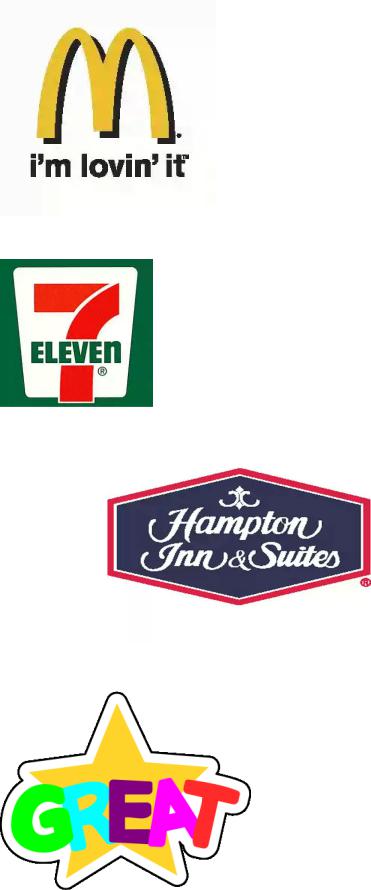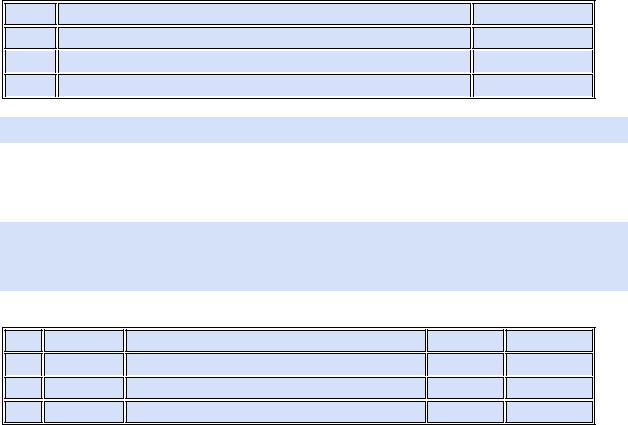
Учебник для магистрантов
.pdf
91
Core Vocabulary:
Franchise—право на производство и продажу продукции другой компанией; договор франшизы
Franchise agreement—договор франшизы
Franchisor—фирма, предоставляющая привилегию Franchisee—предприятие, получившее право продажи марочного
товара фирмы
Grant a right—предоставить право
Trademark/service mark—торговая марка/ торговая марка сервисной фирмы
Fee—плата; денежный сбор
Royalty—гонорар; плата за право пользования (зд. франшизой) Franchised dealer—дилер, продающий товары или услуги по договору
франшизы
Franchising is the practice of using another firm's successful business model. The word 'franchise' is of Anglo-French derivation—from franc—meaning “free”, and is used both as a noun and as a verb. For the franchisor, the franchise is an alternative to building 'chain stores' to distribute goods and avoid investment and liability over a chain. The franchisor's success is the success of the franchisees. The franchisee is said to have a greater incentive than a direct employee because he or she has a direct stake in the business.
Except in the US, and now in China (2007) where there are explicit Federal (and in the US, State) laws covering franchise, most of the world recognizes 'franchise' but rarely makes legal provisions for it. Only Australia, various provinces within Canada, France and Brazil have significant Disclosure laws but Brazil regulates franchises more closely.
Where there is no specific law, franchise is considered a distribution system, whose laws apply, with the trademark (of the franchise system) covered by specific covenants.
Contents:
1.Overview
2.Obligations of the parties

92
3. Franchise agreement
1.Overview.
Businesses for which franchising works best have the following characteristics:
Businesses with a good track record of profitability. Businesses which are easily duplicated.
As practiced in retailing, franchising offers franchisees the advantage of starting up quickly based on a proven trademark, and the tooling and infrastructure as opposed to developing them.
The following US—listing tabulates the early 2010 ranking of major franchises along with the number of sub-franchisees (or partners) from data available for 2004. It will also be seen from the names of the franchise that the US is a leader in franchising innovations, a position it has held since the 1930s when it took the major form of fast-food restaurants, food inns and, slightly later, the motels during the first depression. Franchising is a business model used in more than 70 industries that generates more than $1 trillion in U.S. sales annually (2001 study). Franchised businesses operated 767,483 establishments in the United States in 2001, counting both establishments owned by franchisees and those owned by franchisors:
1.Subway (Sandwiches and Salads | Startup costs $84,300 – $258,300 (22,000 partners worldwide in 2004).
2.McDonald's | Startup costs in 2010, $995,900 – $1,842,700 (37,300 partners in 2010)

93
3.7-Eleven Inc. (Convenience Stores) |Startup Costs $40,500775,300 in 2010, (28,200 partners in 2004)
4.Hampton Inns & Suites (Midprice Hotels) |Startup costs $3,716,000 –
$15,148,800 in 2010
5. Great Clips (Hair Salons) | Startup Costs $109,000 - $203,000 in 2010

94
6. H&R Block (Tax Preparation and e-Filing) | Startup Costs $26,427 - $84,094 (11,200 partners in 2004)
7.Dunkin Donuts | Startup Costs $537,750 - $1,765,300 in 2010
8.Jani-King (Commercial Cleaning | Startup Costs $11,400 - $35,050, (11,000 partners worldwide in 2004)
9.Servpro (Insurance and Disaster Restoration and Cleaning) | Startup Costs $102,250 - $161,150 in 2010
10.MiniMarkets (Convenience Store and Gas Station) | Startup Costs $1,835,823 - $7,615,065 in 2010
There are midi-franchises like restaurants, gasoline stations, trucking stations which involve substantial investment and require all the attention of a business.
95
There are also large franchises — hotels, spas, hospitals, etc.
Two important payments are made to a franchisor: (a) a royalty for the trademark and (b) reimbursement for the training and advisory services given to the franchisee. These two fees may be combined in a single “management” fee. A fee for “disclosure” is separate and is always a “front-end” fee.
A franchise usually lasts for a fixed time period (broken down into shorter periods, which each require renewal), and serves a specific “territory” or area surrounding its location. One franchisee may manage several such locations. Agreements typically last from five to thirty years, with premature cancellations or terminations of most contracts bearing serious consequences for franchisees. A franchise is merely a temporary business investment, involving renting or leasing an opportunity, not buying a business for the purpose of ownership. It is classified as a wasting asset due to the finite term of the license.
A franchise can be exclusive, non-exclusive or “sole and exclusive”. Although franchisor revenues and profit may be listed in a franchise
disclosure document (FDD), no laws require the estimate of franchisee profitability, which depends on how intensively the franchisee “works” the franchise. Therefore, franchisor fees are always based on 'gross revenue from sales' and not on profits realized.
According to the International Franchise Association approximately 4% of all businesses in the United States are franchisee-worked.
Franchisor rules imposed by the franchising authority are usually very strict and important in the US and most countries need to study them to help the small or start-up franchisee in their countries to protect them. Besides the trademark, there are proprietary service marks.
2. Obligations of the parties
Each party to a franchise has several interests to protect. The franchisor is most involved in securing protection for his trademark, controlling the business concept and securing his know-how. This requires the franchisee to carry out the services for which the trademark has been made prominent or famous. There is a great deal of standardization proposed. The place of service has to carry the franchisor's signs, logos and trademark in a prominent place. A service can be successful by buying equipment and supplies from the franchisor or those recommended by the franchisor if they are not over-priced.
The franchisee must carefully negotiate the license. They, along with the franchisor must develop a marketing plan or business plan. The fees must be fully disclosed and there should not be any hidden fees. The start-up, costs, and capital must be known before taking the license. There must be assurance that additional licensees do not crowd the "territory" if the franchise is worked to plan. The franchisee must be seen as an independent merchant. He must be protected by the franchisor from any trademark infringement by third—parties. A franchise attorney is required to assist the franchisee during negotiations.

96
3. Franchise agreement
Franchise agreements carry no guarantees or warranties and the franchisee has little or no recourse to legal intervention in the event of a dispute. Franchise contracts tend to be unilateral contracts in favour of the franchisor. Most franchisors make franchisees sign agreements waiving their rights under federal and state law, and in some cases allowing the franchisor to choose where and under what law any dispute would be litigated.
Work plan
1. Translation.
Franchise agreement—a legal agreement that allows one organization with a product, idea, name or trademark to grant certain rights and information about operating a business to an independent business owner. In return, the business owner (franchisee) pays a fee and royalties to the owner.
Договор франшизы—правовой договор, который позволяет одной организации (фирме, предоставляющей привилегию), имеющей продукцию, идею, имя или торговую марку предоставлять определенные права и информацию о ведении бизнеса независимому собственнику бизнеса. В свою очередь, собственник бизнеса (предприятие, получившее право продажи марочного товара фирмы) платит денежный сбор и плату за право пользования собственнику.
2. Questions to the text.
1.What does a franchise agreement mean?
2.Why is an attorney required to sell or purchase the rights to operate a certain business?
3.Why do some entrepreneurs choose a franchise business?
4.Who grants and who obtains the right to use a trademark, know-how or technology?
5.What does a franchisee pay for?
3. Grammar in use.
1. The franchisee is said to have a greater incentive than a direct employee because he or she has a direct stake in the business.
The franchisee is said to have—конструкция сложного подлежащего
2.Franchising is the practice of using another firm's successful business model. using—неличная форма глагола — герундий
3.These two fees may be combined in a single “management” fee.
may be combined may—модальный глагол
be combined—инфинитив в страдательном залоге
4. Franchisor rules imposed by the franchising authority are usually very strict.
97
Imposed—причастие II (в функции определения)
Clinical training in court. (Sample of a report on clinic)
The court is an organ of state that administers justice on the basis of the laws of the state. The basic judicial organ is the district court. It tries both criminal and civil cases. Cases are tried in public and proceedings are oral. The participants in the trial / the victim, the accused, the plaintiff, the defendant and others/ speak in open court. The accused has the right to defence.
Like all students of the legal profession I took a training clinic course in court for two weeks. I got acquainted with the structure of the court, the rules of civil and criminal procedure, the work of federal judges and the clerks of the court. I was taught to work with summons sending them to citizens and organizations and various court documents, just the way lawyers do. I also got acquainted with the principles of electronic filing.
I find this experience very useful. It helped me realize what the judge’s job is like. I consider it a very difficult and responsible job – you deal with people, protect their rights, impose punishment. So, it’s very nervous but it’s very important too.
Clinical training at the Public Procurator’s Office (Sample of a report)
The Office of the Public Procurator in the Russian Federation is entrusted
with:
1.Prosecution in courts on behalf of the state including public prosecution in criminal cases and public control in some civil cases.
2.Supervision of the observance of the law by the state and municipal organs, officers, organizations and citizens.
3.Protection of human rights.
A clinic course in the Office of the Public Procurator is an obligatory part of the curriculum at Russian law universities. Usually a clinic course takes one or two weeks in a District Office of the Public Procurator. The main aim for students is to get some practical skills of lawyer’s work. Also they must be acquainted with the procurator’s duties and learn clerk’s work. The public procurators in Russia are

98
professional lawyers, so they can teach students to understand laws and apply them. That’s why a clinic course in the Office of the Public Procurator is essential for students.
I had a clinic course in a District Office of the Public Procurator in Moscow in July, 2012. It was my first experience as a lawyer.
Firstly, I was informed about the public procurator’s duties in civil proceedings.
Supervision of the observance of law is very important. Any person who thinks that his or her rights are violated by the state, the municipal organs or some other organizations, can address to the procurator. The procurator has the right to appeal against any unlawful decisions and actions of state organs and persons in office. The procurator maintains prosecution before the court in the name of the state.
I think that the clinic course in the Office of the Public Procurator was very useful for me as a future lawyer.
Sample of an elective course test list
Elective course test list
№ |
Study year |
Course, |
Name |
Hours |
Branch |
|
group |
|
scheduled |
attended |
of law |
||
|
|
|
||||
Teacher’s Teacher’s recommendations signature
Sample of an attendance form of sections, studios and optional courses
The attendance form of sections, studios and optional courses
|
|
|
|
|
|
|
|
|
|
|
|
|
|
|
Study |
|
Course, |
|
Name of the |
|
Confirming |
|
Signature of the Head of |
|
|
№ |
|
|
|
additional |
|
|
the additional education |
|
Points |
|||
|
year |
|
group |
|
documents |
|||||||
|
|
|
|
education system |
|
|
system |
|
|
|||
|
|
|
|
|
|
|
|
|
|
|
||
|
|
|
|
|
|
|
|
|
|
|
|
|
|
|
|
|
|
|
|
|
|
|
|
|
|
|
|
|
|
|
|
|
|
|
|
|
|
|
|
|
|
|
|
|
|
|
|
|
|
|
|
|
|
|
|
|
|
|
|
|
|
|
|
|
Teacher’s signature: __________________________________

99
Sample of an academic self-analysis form
The academic self-analysis form
Student______________ _____Group __________Course
Study year: ___________________
Date: _______________
My past year results:
1.From the scheduled I managed to perform:
2.I didn’t manage to perform ______________________, because:
3.In the Legal English course the most important things for me became:
4.During this study year the most significant for me was:
5.During this study year my self-evaluation has changed:
6.Nowadays the most significant branch of law for me is
________________________, as:
Signature: _______________
Sample of the student’s achievements list
Personal achievements list
№ |
|
Education |
|
Name of the |
|
Level |
|
Place |
|
Points |
|
sphere |
|
document |
|
|
|
||||
|
|
|
|
|
|
|
|
|
||
|
|
|
|
|
|
|
|
|
|
|
Olympiads
Conferences
Competitions
Contests
Festivals
Other activities

100
Sample of the certification list
Certification list
№ |
Name of the document |
Points |
Signature:
Awards list
(Sample of an award form)
№ |
Level |
Name of the document |
Place |
Points |
My achievements
(Sample of an essay on personal achievements)
I don’t like to speak about my achievements but there’s something I’m really proud of – I passed all the exams with flying colours and from now on I will be getting my education at the university free of charge. Frankly speaking, I’ve always been an A-student. I like to study. When at school I often took part in different contests and conferences. My favourite subjects were history and social science, so, I had no doubt about choosing the legal profession.
When I was in my first year at the university I joined the students’ drama club.
The two performances I took part in were a great success.
Now I am a trainee at the Law Clinic of the University, I help poor people, solving their problems. It takes much time, but it's good experience for me as a future lawyer.
